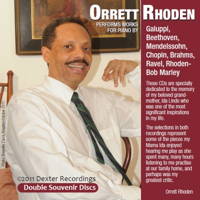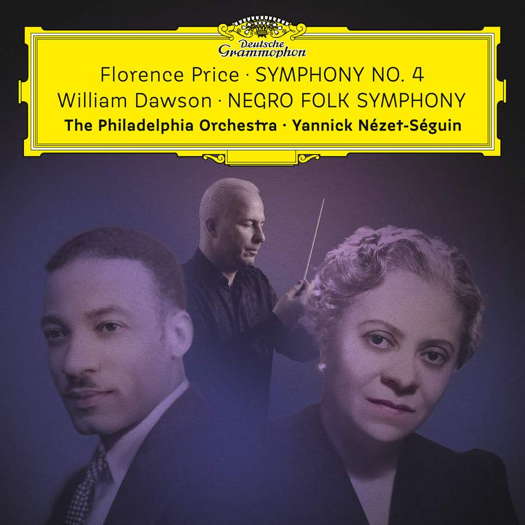 SPONSORED: CD Spotlight. Most Remarkable - Jamaican pianist Orrett Rhoden, heard by Bill Newman.
SPONSORED: CD Spotlight. Most Remarkable - Jamaican pianist Orrett Rhoden, heard by Bill Newman.
All sponsored features >>
 DISCUSSION: What is a work? John Dante Prevedini leads a discussion about The performing artist as co-creator, including contributions from Halida Dinova, Yekaterina Lebedeva, Béla Hartmann, David Arditti and Stephen Francis Vasta.
DISCUSSION: What is a work? John Dante Prevedini leads a discussion about The performing artist as co-creator, including contributions from Halida Dinova, Yekaterina Lebedeva, Béla Hartmann, David Arditti and Stephen Francis Vasta.
 SPONSORED: A Seasoned Champion of New Music. Argentinian-American pianist Mirian Conti in conversation with Andrew Schartmann.
SPONSORED: A Seasoned Champion of New Music. Argentinian-American pianist Mirian Conti in conversation with Andrew Schartmann.
All sponsored features >>

A Complete Triumph
GERALD FENECH is exhilarated by the Philadelphia Orchestra's recording of symphonies by Florence Price and William Dawson
'... a vibrant energy that makes the music sound as fresh and exciting as when it was first heard.'
Ever since the mid 1930s, the Philadelphia Orchestra has been an indefatigable advocate of American composers who are women and people of colour, and no matter who the conductor was, these composers, if not with frequent regularity, were also included in their concert programmes. This wonderful disc continues this tradition with convincing music-making that showcases the genius of these composers, many of which still languish by the wayside.
Florence Price (1887-1953) was somewhat lucky in having the unstinted support of the Philadelphia Orchestra practically throughout her career and even after her death in 1953. Price came to the attention of American music lovers in 1933 when the Chicago Symphony premiered her first symphony. It was the first time a US orchestra had played a major symphonic work by a black woman.
The Fourth Symphony was composed in 1945, but not performed during her lifetime. Indeed, it was discovered among a treasure trove of other works following her death. Since that time, her compositions continue to be discovered and performed the world over.
The score includes a huge array of instruments that comprise strings, brass, woodwinds as well as a beefy percussion section that includes several types of drums, cymbals, gong, bells, triangle and tambourine.
Listen — Florence Price: Tempo moderato (Symphony No 4 in D minor)
(4865137 track 1, 0:00-0:55) ℗ 2023 Deutsche Grammophon GmbH :
The four-movement work is engaging and well-balanced throughout, with intricate orchestration and exciting harmonic invention. There's good humour in the third movement ('Juba'), which refers to a spirited dance created and performed by people enslaved on plantations.
Listen — Florence Price: Juba (Symphony No 4 in D minor)
(4865137 track 3, 0:00-0:50) ℗ 2023 Deutsche Grammophon GmbH :
Indeed, there are ample opportunities for the orchestra's principal musicians to shine, and themes from a number of Black Spirituals are woven in the texture of each section. The symphony ends in a cloudburst of triplets conducted by Yannick Nézet-Séguin in his most effervescent style.
Listen — Florence Price: Scherzo (Symphony No 4 in D minor)
(4865137 track 4, 4:32-5:09) ℗ 2023 Deutsche Grammophon GmbH :
William Dawson's Negro Folk Symphony was composed in 1934 and later revised in 1952. The composer remarked in a 1932 interview:
I have not tried to imitate Beethoven or Brahms, Franck or Ravel - but to be just myself, a Negro. To me, the finest compliment that could be paid my symphony is that it unmistakably is not the work of a white man. I want the audience to say, 'Only a Negro could have written that.'
Listen — William Dawson: Hope in the Night (Negro Folk Symphony)
(4865137 track 6, 3:33-4:24) ℗ 2023 Deutsche Grammophon GmbH :
Two years later, Leopold Stokowski led the Philadelphia Orchestra in the symphony's premiere. Critics and audiences alike hailed it as a masterpiece. But despite this lavish praise and Stokowski's advocacy, within a few years, both music and composer had faded into relative obscurity. William Dawson's (1899-1990) piece is in three titled movements:
1 The Bond of Africa
2 Hope in the Night
3 'Oh, Le' Me Shine, Shine Like a Morning Star!'
The composer wanted his symphony to be considered as 'symbolic of the link uniting Africa with her descendents in America'.
Dawson's compositional fecundity comes out to telling effect, and its dramatic content encapsulates a vast array of human emotions such as sorrow, joy, hope, resignation, pain and eventual solace.
Listen — William Dawson: Oh, Le' Me Shine, Shine Like a Morning Star!
(Negro Folk Symphony)
(4865137 track 7, 7:29-8:18) ℗ 2023 Deutsche Grammophon GmbH :
Musicologist Gwynne Kuhner Brown observes:
The themes are handled with such virtuosic flexibility of rhythm and timbre that each movement seems to evolve organically, creating a persuasive bridge between the 'Negro Folk' and the 'Symphony'.
Nézet-Séguin's conducting is a complete triumph, and the Philadelphians respond with a vibrant energy that makes the music sound as fresh and exciting as when it was first heard. Deutsche Grammophon's Florence Price: Symphony No 4; William Dawson: Negro Folk Symphony is an exhilarating issue in fine sound and annotations that is a must buy.
Copyright © 2 October 2023
Gerald Fenech,
Gzira, Malta



